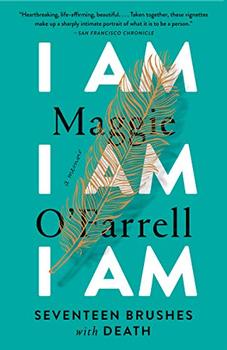Summary | Excerpt | Reading Guide | Reviews | Beyond the Book | Readalikes | Genres & Themes | Author Bio

Seventeen Brushes with Death
by Maggie O'Farrell
Two weeks later, a police car drives up the winding track to the guesthouse and two people get out. I see them from an upper window, where I'm wrestling pillows into their cases. I know straight away what they are doing here, why they have come, so even before I hear someone calling my name, I am walking down the stairs to meet them.
These two are nothing like the policeman at the station. They are in suits, their demeanours serious, focused. They proffer badges and documents to my boss, Vincent, with faces that are still with practised, skilled neutrality.
They want to talk to me in private so Vincent shows them into an unoccupied room. He comes in with us because he is a good man and I am only a few years older than his own children, whose cries and shouts can be heard from the back lawn.
I sit on a bed I made that morning, and the policeman sits at an ornamental wicker table where some guests like to take their morning tea; the policewoman seats herself next to me on the bed.
Vincent hovers in the background, muttering mistrustfully, pretending to adjust a crystal hanging at the window, to wipe non-existent dust off the mantelpiece, to rattle the fire-irons in the grate. He is a former flower child, a Haight-Ashbury survivor, and has a low opinion of what he calls "the fuzz."
The police ignore him, in a polite but preoccupied way. They are interested, the woman tells me, in a man I encountered recently on a walk. Would I be able to tell them exactly what happened?
So I do. I start at the beginning, describing how I passed him early on the hike, how he headed off in the opposite direction, then somehow appeared ahead of me. "I don't know how he did that," I say, "because there isn't a short-cut, or not one that I know of." They nod and nod, listening with a measured intensity, encouraging me to go on. Their eyes never leave my face: I have their absolute attention. When I get to the part about the binoculars strap, they stop nodding. They stare at me, both of them, their eyes unblinking. It is a strange, congested moment. I don't think any of us breathes.
"A binoculars strap?" the man asks.
"Yes," I say. "And he put it around your neck?" I nod. They look away, look down; the woman makes a note of something in her book. Would I be willing, she asks, as she hands me a folder, to take a look at some photographs and let them know if I see him there?
At this point, my boss interrupts. He can't not. "You don't have to say anything, you know, you don't. She doesn't have to say anything."
The policewoman is putting up her hand to silence him, just as I am placing my index finger on a photograph.
"That's him," I say.
The detectives look. The woman notes something again in her book. The man thanks me; he takes the folder.
"He killed someone," I say to them, "didn't he?" They exchange an unreadable glance but say nothing. "He strangled someone. With his binoculars strap." I look from one to the other and we know, we all know. "Didn't he?"
From across the room, Vincent swears softly. Then he walks over and gives me his handkerchief.
The girl who died was twenty-two. She was from New Zealand and was backpacking around Europe with her boyfriend. He was unwell that day so had stayed behind at their hostel while she went off on a hike, alone. She was raped, strangled, then buried in a shallow pit. Her body was discovered three days later, not far from the path where I had been walking.
I only know all this because I read about it in the local newspaper the following week: the police wouldn't tell me. I saw a headline in a newsagent's window, went in to buy a paper, and there was her face, looking out at me from the front page. She had light-coloured hair, held back in a band, a freckled face, a wide, guileless smile.
It wouldn't be an exaggeration to say that I think about her, if not every day then most days. I am aware of her life, which was cut off, curtailed, snipped short, whereas mine, for whatever reason, was allowed to run on.
Excerpted from I Am, I Am, I Am by Maggie O'Farrell. Copyright © 2018 by Maggie O'Farrell. All rights reserved. No part of this excerpt may be reproduced or reprinted without permission in writing from the publisher.
Your guide toexceptional books
BookBrowse seeks out and recommends the best in contemporary fiction and nonfiction—books that not only engage and entertain but also deepen our understanding of ourselves and the world around us.